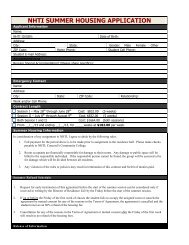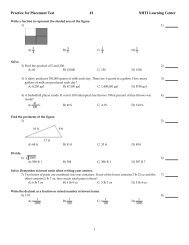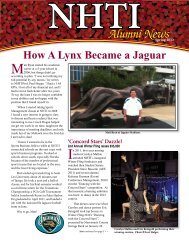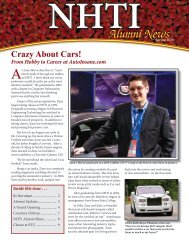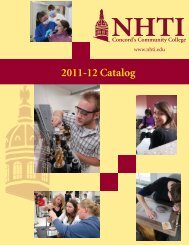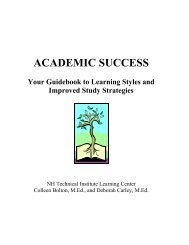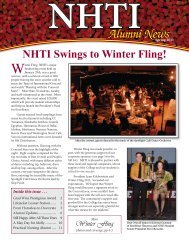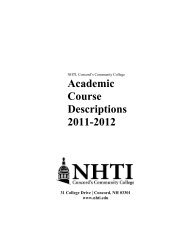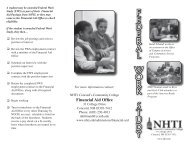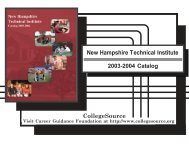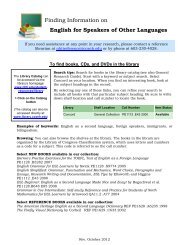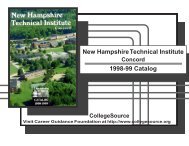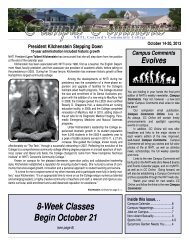Catalog 05-06 - NHTI - Concord's Community College
Catalog 05-06 - NHTI - Concord's Community College
Catalog 05-06 - NHTI - Concord's Community College
- No tags were found...
Create successful ePaper yourself
Turn your PDF publications into a flip-book with our unique Google optimized e-Paper software.
Copyright & Disclaimer Information: Copyright © 1994, 1995, 1996, 1997, 1998, 1999, 2000, 2001, 2002, 2003, 2004, 20<strong>05</strong>, 20<strong>06</strong>, 2007. <strong>College</strong>Source®, Inc. and Career Guidance Foundation. <strong>College</strong>Source® digital catalogs are derivative works owned and copyrighted by <strong>College</strong>Source®, Inc. and Career Guidance Foundation. <strong>Catalog</strong> content is owned and copyrighted by the appropriate school. While <strong>College</strong>Source®, Inc. and Career Guidance Foundation provides information as a service to the public, copyright is retained on all digital catalogs.Copyright & Disclaimer Information: Copyright © 1994, 1995, 1996, 1997, 1998, 1999, 2000, 2001, 2002, 2003, 2004, 20<strong>05</strong>, 20<strong>06</strong>, 2007. <strong>College</strong>Source®, Inc. and Career Guidance Foundation. <strong>College</strong>Source® digital catalogs are derivative works owned and copyrighted by <strong>College</strong>Source®, Inc. and Career Guidance Foundation. <strong>Catalog</strong> content is owned and copyrighted by the appropriate school. While <strong>College</strong>Source®, Inc. and Career Guidance Foundation provides information as a service to the public, copyright is retained on all digital catalogs.Course DescriptionsEarly Childhood EducationEC 102 Foundations in Early Childhood Educationand Child Care 3-0-3The course provides students with an overview of developmentally appropriatesettings for children from birth through age 8. Focusing on playas a foundation of children’s learning, students explore the roles andresponsibilities of the early childhood professional with children andfamilies in these settings while integrating the influences of early childhoodhistory, philosophy, and curricular models on these programs. Programobservations help students make the connections between theoryand practice. Using the NH ECE Career Lattice, students discover thediversity of career opportunities available. (Prerequisites: EC 125 andEC 141)EC 125 Growth and Development of the Young Child 4-0-4Major theories and research findings in the social, emotional, cognitive,and physical domains of development of young children from conceptionto age eight will be the focus of this course. Emphasis will be placedon applying understanding of the following theories to children’s needs ina pluralistic society: progressive education theory, psychosocial theory,behaviorist theory, cognitive theory, sociocultural theory, maturation theory,humanist theory, attachment theory, moral development theory, and multipleintelligences theory. Students will use professional strategies (anecdotalrecords, time samplings, etc.) to observe and record the behavior ofinfants, toddlers, preschool, and primary age children in early childhoodsettings as they explore these theoriesEC 141 Curriculum and Environments 1 3-0-3Students will experience designing, implementing, and evaluating appropriateactivities and environments for children birth through age six witha focus on emergent literacy supported by music, movement, art, anddramatic play. Students will learn how children develop an understandingof the language processes of listening, speaking, reading, writing, andvisually representing by exploring vocabulary development and phonemicawareness. Emphasis will be on concrete, practical application of variousphilosophies, theories, and current research in early childhood education.Methods of observing children’s behavior and progress, and developingand using suitable instructional and play materials will be discussed.Participants will experience and broaden their own creativity and imaginationthrough exploring learning activities that can be applied to actualearly childhood settings. Emphasis will be on planning stimulating, ageappropriateclassroom and outdoor learning environments that encouragechild-initiated discovery and act as a tool in behavior management. Theseenvironments will be child and family friendly, barrier free, inclusionary,and meet state regulatory requirements.EC 142 Curriculum and Environments 2 3-0-3Designing, implementing, and evaluating appropriate activities and environmentsfor children through age six with a focus on blocks, math,science, woodworking, and technology with literacy concepts integratedinto each area. Emphasis will be on the concrete, practical application ofvarious philosophies, theories, and current research in early childhoodeducation. Methods of observing children’s behavior and progress anddeveloping and using suitable instructional and play materials will bediscussed. Emphasis will be on planning stimulating, age-appropriateclassroom and outdoor learning environments that encourage child-initiateddiscovery and act as a tool in behavior management. These environmentswill be child and family friendly, barrier free, inclusionary, and meetstate regulatory requirements. Students will learn about and apply successfulattributes of documentation panels that make children’s learningvisible. (Prerequisite: EC 141; corequisites: may be taken with EC 102,EC 188, EC 190 and EC 242)EC 155 Children’s Literature 3-0-3This course will provide an overview of exemplary authors and illustratorsof children’s literature from birth to age 8. High quality children’sbooks will be used as a vehicle for supporting and applying current researchon the acquisition of language and reading. Students will becomefamiliar with Caldecott award winning books and the artistic techniquesused to create these books. Big books will be introduced as a way ofdistinguishing features of print. Poetry, multicultural books, and bibliotherapyas applied to early childhood education will be studied. Additionally,students will explore the teacher’s role in promoting family literacyand participate in service learning on this topic. (Prerequisite: EC141 unless taken concurrently with EC 141)EC 188 Health, Safety and Nutrition in EarlyChildhood Education 3-0-3An introduction to major issues affecting the health and safety of youngchildren in early childhood settings. Nutrition and policy considerationsabout pediatric medications, infectious disease control, sick child care,universal precautions and liability, and health record keeping will bediscussed. Childhood stress and education for the prevention of childsexual abuse will be highlighted. Students will practice developing curriculumfor young children related to health, safety, and nutrition thatbecomes an integrated part of the overall program.EC 190 Preparing for Practicum 1-0-1This 1 credit course will provide students with an orientation to Practicumincluding developing individual goals, planning contracts, scheduling,record keeping, writing practicum log entries, preparing the practicumnotebook, identifying potential partners, and following professional andethical guidelines. Students will know all policies and procedures relatedto practicum and student teaching as outlined in the Practicum Handbook.Students must earn a “C” or higher in this course and must take it in thesemester before Practicum 1. (Prerequisites: EC 125, EC 141 and EC 155must be taken the semester before the “Preparing for Practicum” course;may be taken concurrently with EC 102, EC 142 or EC 188)EC 212 Planning Infant/Toddler Programs 3-0-3Using research on brain development during the first 3 years of life,students will focus on developing appropriate programs for infants andtoddlers. Attending to the roles of primary caregiving, transitions, andcontinuity of care, students will design programs that are responsive tothe needs of both children and their families. The course is not a requirementin the Early Childhood Education associate degree program but will be offered everyother year for students interested in specializing with infants and toddlers. Studentseligible for funding for this course through the Child Development Bureau may waiveprerequisites with permission of the department head of Early Childhood Education.(Prerequisites: EC 125, EC 141, EC 142 and EC 188)EC 220 Developmentally Appropriate Programsfor School-Aged Children 3-0-3The role and responsibilities of early childhood educators and child careproviders in creating developmentally appropriate experiences for schoolagechildren will be addressed. Discussion will include an integrated approachto language, reading, math, science and the arts for primary classroomsand activities such as clubs, projects, hobbies, music, games, andother themes suitable for after-school care programs. The importance ofcommunication in building partnerships between home, school and communitywill be emphasized. (Prerequisite: EC 120)EC 231 Early Literacy Development 3-0-3Early literacy development involves listening, speaking, drawing, writing,singing, and acting as well as reading. It includes all the ways childrencommunicate ideas and receive those of others. This course will focus onconcepts underlying early literacy development and using children’s literatureand creative activities to enable students to develop a repertoire ofexperiences and portfolio of resources to enhance emergent literacy inyoung children.EC 242 Child, Family and <strong>Community</strong> 3-0-3The course will provide an overview of families and family systems(including Bronfenbrenner’s Bioecological Theory) with emphasis on developingeffective models of teacher/program-family partnerships. Studentswill study stages of parenthood and apply stages to school/familyrelationships. Students will identify their own biases as a precursor toexploring issues of power and privilege in society. Cultural dilemmas and97



